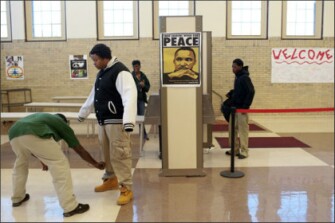Tracy Martin, the father of the African-American teenager who was shot and killed last year in an incident that renewed national debates over race relations, urged members of Congress to improve the educational opportunities of black boys.
Nationwide, statistics show that African-American boys tend to have poorer educational outcomes than their white peers. An Education Week report found such students are disproportionately affected by school discipline policies, effectively funneling them into “school-to-prison pipelines.”
Martin, with three other experts and advocates, testified yesterday at a hearing by the Congressional Caucus on Black Men and Boys, on the status of America’s black youth and men, and the efforts needed from politicians and community members to help provide more opportunities for black youth and men and improve their outcomes in society.
The hearing came in the wake of the not guilty verdict of George Zimmerman, the neighborhood watch leader who shot the unarmed Trayvon Martin in February 2012, after calling police to report that the younger man looked “suspicious.” Mr. Zimmerman claimed that his actions were in self-defense.
“As citizens, we can’t stand by and let a not guilty verdict dictate what our youth legacy becomes,” the elder Martin said at the hearing.

David Johns, the executive director at the White House Initiative on Educational Excellence for African Americans, stressed the need for programs and mentoring to address the achievement gap between black children and their higher-performing white and Asian counterparts, and the need for increased entrepreneurial opportunities among black males.
“Neither ZIP code nor skin tone should predetermine the quality of a child’s opportunities,” Johns said, but as some of Education Week‘s coverage suggests, this is not the case in some parts of the country.
To improve schooling outcomes for black boys and men, Johns emphasized the need to improve early-education opportunities, suggesting that quality early-education programs can provide the foundation of success for black boys.
He also pointed to the need for community engagement and awareness on the importance of investing during the critical early years of development, and making improvements to other areas of black life—access to child care, better community engagement, more role models in education, and correcting the myth that black people are incapable of high achievement.
Michael Eric Dyson, a sociology professor at Georgetown University, and Kweisi Mfume, a former U.S. representative from Maryland and a former president of the NAACP, also testified, sharing personal experiences, talking about the symbolism of the “hoodie” worn by Trayvon and millions of other teenagers as a type of uniform, and the cultural perceptions of black manhood.
“We want to give them a sense of pride, a sense of commitment,” Mfume said, “to fire up an innate belief that’s in all children that they can be whatever they want to be, and do whatever they want to do,” and to get them to believe that they are great people.
My colleague Jackie Zubrzycki over at the District Dossier blog has a little more on the different types of programs focused on African Americans and boosting their opportunities in school and career.
Photo: A student passes through security at the beginning of the school day at Christian Fenger Academy High School in Chicago. School officials around the country are working to balance school security with the need to maintain a positive learning environment. —Peter Hoffman for Education Week